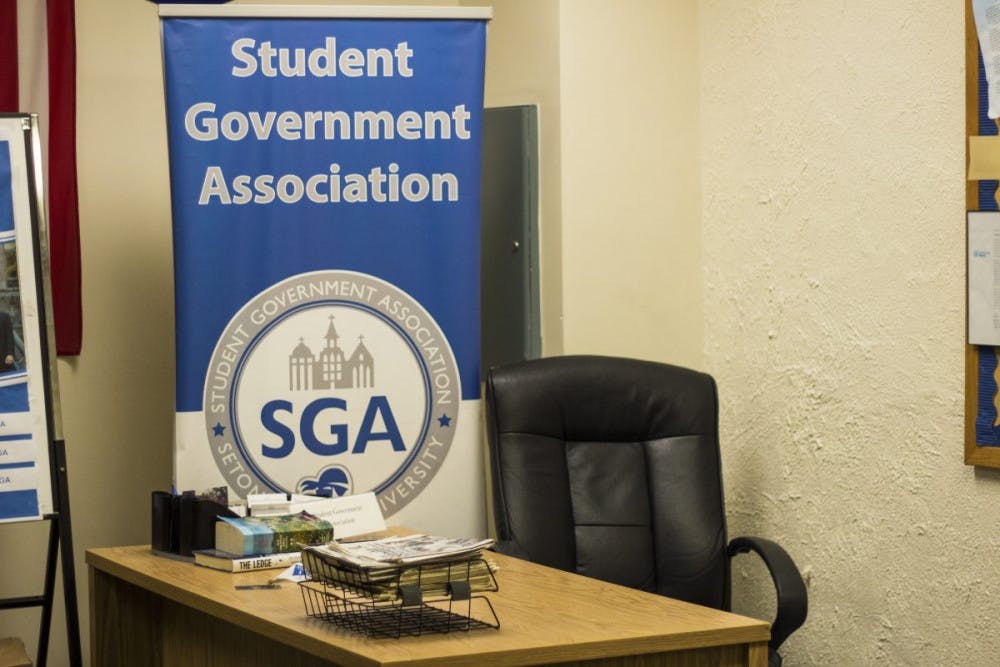As Student Government Association (SGA) elections draw near, presidential candidate and current Senate Secretary, Adrian Orozco, has compiled a list of grievances he has noted within the organization.
Orozco, member of the SGA Finance Committee and a sophomore political science major, recently notified The Setonian of several instances that he felt to be clear breaches of the SGA constitution and bylaws. He said that this information was open to the public and that he was not “revealing SGA secrets.” He further insisted that the timing of pointing out these grievances has nothing to do with the impending elections, which begin on March 27.
As senate secretary, Orozco’s responsibilities include recording meeting minutes, sending warning letters to SGA members who do not complete their required weekly office hours and, according to At-Large Senator Christopher Morbelli, a senior political science major, notifying senators and Executive Board members when they are in violation of the rules.

However, Morbelli said that while The Setonian has been made aware of these breaches, not all senators have.
“Our minutes do not reflect either the Parliamentarian or the Senate Secretary in advising senators to fully fulfill their duties or correcting them when in violation of the bylaws,” Morbelli said.
Orozco said that his intention in sharing these grievances is to create “a little more transparency” in SGA.
The first instance Orozco cited was the creation of the SGA budget. According to the SGA Constitution, Article III, Section II, line c.i, the SGA Treasurer must “assist the Finance Committee in the formulation of a budget, under normal operating circumstances as stipulated by the bylaws to be submitted to the Senate for approval before the end of the month of September.”
Orozco said that while Treasurer Alyssa Potenzone and the Finance Committee are currently in the process of approving the 2017-18 SGA budget policy, the Executive Board has not presented a budget to the Senate in the past three years.
Orozco said that he had informally brought his concerns to the attention of SGA President Teagan Sebba on two separate occasions, but those concerns were “not heeded to.”
“I guess the E-Board thinks of it as an efficiency thing,” Orozco said. “Like, it’s not really necessary. It just takes up another meeting.”
However, when The Setonian presented both Sebba and third-year SGA Adviser Maggie Bach with the claim that the Executive Board has not gotten Senate approval on the budget, they both refuted it, stating that the budget policy has been created and approved by the Senate each year and enacted by a partnership of the treasurer, who is a member of the Executive Board, and the Senate Finance Committee.
Morbelli also provided meeting minutes and emails verifying the dates of the approvals. The 2015-16 budget policy was approved during a meeting on Sept. 21, 2015, and the 2016-17 budget policy was presented to the senators via email upon request on April 25, 2016. Since no one drew an issue or asked to bring it up at a meeting, it was accepted.
“The rest of the E-Board has played no role,” Sebba said in an email interview. “I can say this confidently because I, myself, have been on E-Board for the past three years.”
Sebba added that the Finance Committee is open to everyone to join; it is even a requirement for the committee to include at least one non-SGA member. Sebba said that meeting attendees can often see the finance chairperson or treasurer asking for participation during each of their reports to complete the “daunting” task of creating the budget.
Orozco said that only one or two other senators have complained informally about the matter.
“The Senate seems apathetic about it, as if they don’t care,” Orozco said. “Only a few senators care that we don’t approve the budget. Most senators probably don’t even know that we have to approve the budget, that we have that power as elected senators.”
…
The second complaint Orozco brought to The Setonian’s attention was on the matter of the appointment of an assistant treasurer. According to Sebba, “there is a lot of precedent” that influences the appointment of an assistant treasurer, which Treasurer Potenzone had the option to do this year if she felt the need.
Potenzone appointed Michael Roma, a sophomore diplomacy, economics and finance major, who is currently a sworn SGA senator, to the position of assistant treasurer for the 2016-17 school year. Roma’s responsibilities include delivering the Treasurer’s report when Potenzone cannot attend meetings due to a conflict with her class schedule.
“Michael Roma was chosen to be Assistant Treasurer because he is one of the only senators who attends a majority of the Finance Committee meetings,” Potenzone said in an email interview. “He is very involved and because of that I thought he would be a good fit.”
Orozco said that Roma’s appointment is an issue because this makes Roma a member of both the executive and legislative branches of student government, something the SGA Constitution forbids.
However, Sebba also refuted this claim, saying that Roma’s appointment is not an executive one, meaning that the SGA President did not make the appointment. She said that his appointment does not make him a member of the executive board and therefore could not make him a member of the executive branch.
Bach agreed with Sebba.
“I don’t see this as a problem,” Bach said. “The Treasurer needed assistance and appointed someone with Finance Committee experience to help her.”
Potenzone, who served as assistant treasurer during the 2015-16 school year, said that she chose to ask Roma to deliver her updates in her place as opposed to Thomas Kraft, a junior political science and philosophy major and Finance Committee chairman. She said she did this in an effort to keep the Finance Committee separate from the responsibilities of the treasurer, effectively keeping the legislative and executive branches separate.
Orozco said that when he verbalized his concern to Kraft and Roma earlier this semester, he was brushed off with a joke, saying that Roma isn’t really Assistant Treasurer but “assistant to the treasurer.”
“It just ended at that with a one-line response,” Orozco said. “I didn’t pursue it much after that, but it’s clear he’s serving as Assistant Treasurer. He does the reports as if he’s the Treasurer. He’s been commenting on The Setonian articles as if he was the Treasurer, while Alyssa hasn’t.”
Roma is currently running for Treasurer on the Simon-Reed ticket, led by presidential candidate and current SGA Secretary Christina Simon, a sophomore English and psychology major. Orozco is running for SGA President on the Reform Party ticket.
The third complaint that Orozco brought to The Setonian’s attention dealt with Robert’s Rules of Order, the set of rules that SGA has adopted to govern meetings.
According to Robert’s Rules of Order, “you can’t transfer time” during a debate. “When you yield the floor, you waive your remaining time, but that remaining time doesn’t get added to another member’s time.”
Orozco said that Senator Morbelli yielded, or gave his speaking time, to Sebba on two separate occasions this school year. The first was on Oct. 17, 2016, during debate about a Multicultural Advisory Committee co-sponsorship. The second was on Feb. 13, 2017, during a debate on a women’s leadership development book club, presented by Bach. Bach excused herself during this discussion so the group could speak freely about her request.
Orozco added that there was a third instance between the two recorded instances, but he raised a point of privilege, saying that the Senate cannot yield time during debate. He said that Zachariah Boyer, senior political science major and SGA parliamentarian, backed this claim and did not permit Morbelli to yield his time to Sebba.
Orozco said that both of Sebba’s comments were in favor of the co-sponsorship requests. Her support was documented in the Oct. 17 meeting minutes, but not the Feb. 13 meeting minutes.
Orozco, who is tasked with recording all meeting minutes, said he did not record Sebba’s response because “she’s technically not allowed to influence debatable senate motions.”
“I actually wasn’t even paying attention to what she was saying,” Orozco said. “I missed that part.”

“If Parliamentarian Boyer found it as a violation of procedure, which was not the case during either of the instances referenced, that is not a violation of our Bylaws – it’s simply speaking out of turn,” Sebba said.
Morbelli agreed that neither Boyer nor Orozco said anything during either of the noted instances.
“I chose to yield to President Sebba because she had the most knowledge pertaining to both topics. As such, I felt the Senate would benefit further from hearing from President Sebba,” Morbelli said. “Should the most qualified person be in the Senate, we would trust their opinion more.”
Orozco, however, said that is what the President’s Report and Open Forum portions of the SGA meeting are for and that he’s already spoken to Boyer about putting a stop to it.
“[Sebba] is a role model to many of our student leaders so yes, I do think that her opinion could influence others, and that is the essence of debate,” Bach said. “She was elected to have her voice be the voice of the students. The constitution allows for her to have voice in the meeting. Whether or not that extends to debate, I defer to Parliamentarian Boyer.”
Boyer did not respond to The Setonian’s requests for comment.
“There are a lot of nuances to parliamentary procedure. In my 10-year career I have never seen a student group use it perfectly,” Bach said. “However, I believe that our SGA follows their bylaws, constitution and Robert’s Rules to the best of their ability. Any errors, I’m confident, happen in good faith.”
Bach added that this year, she has witnessed the most “well-run and productive” meetings during her time at Seton Hall.
According to the SGA Bylaws, all senators are required to serve one open office hour in the SGA office per week; members of the Senate Leadership Committee (all committee chairs, the Senate Secretary, Parliamentarian and Senate Speaker) and Executive Board must serve two.
Orozco pointed out that the sign-in binder indicates that some senators frequently fail to complete their required office hours, and Sebba has not logged any during the Spring 2017 semester.
Does this mean that the officers are choosing not to fulfill their time requirements? Not in Sebba’s case.
“I’ll admit, since I was a freshman senator I have sometimes forgotten to sign in,” Sebba said. “I could literally save the world in that office and still forget to sign my three initials into that binder.”
Sebba said that while she does not have an assigned time listed in the binder, she is in the office from 2-4 p.m. on Mondays, and when she is not she reschedules for Friday, most of the time spending more than two hours per week in the office.
While both Sebba and Bach noted that the tracking of office hours falls into Orozco’s jurisdiction, Orozco pointed at the Senate Speaker and the Student Leadership Committee.
Elianni De La Cruz, Senate Speaker and junior economics major, said in an email that office hours are the individual responsibility of each senator and executive board member, but there is no real method to enforce their completion.
De La Cruz explained that it is the Senate Secretary’s job to maintain sign-in sheets and relay issues to her.
Bach said that the Senate Leadership Committee can ask members who in SGA they feel are not meeting expectations, and from there they could receive a warning or ultimately be brought to the Senate for impeachment. She said that while she’s seen this happen for missed Senate meetings, she’s never seen someone brought up for impeachment due to missed office hours.
Orozco said that he sent warning emails to officers who did not complete their hours in the fall, but that this semester, the committee has been more focused on addressing absences at meetings, so no warning emails have been sent.
Orozco said that he does not expect his observations to cause much of an issue during elections because his presidential opponents have generally stayed out of what he deems to be issues.
One such opponent, Billy Toney, a junior communication major and current SGA senator, thinks that though Orozco has been hard-working and passionate about leadership and reaching out to students and administration, his timing was poor.
“I think it’s petty to present problems with SGA officers’ attendance when elections are so close,” Toney said. “It’s kind of petty to accuse SGA officers of not doing hours when there is no proof of this accusation other than what’s presented in a sign-in sheet.”
Toney said that while he has consistently served his weekly office hours, he often forgets to sign in and has never received any kind of disciplinary action for it.
While it is still unclear as to whether the SGA Constitution and Bylaws have been breached due to the conflicting reports members of SGA have given, The Setonian has not received an account that agreed with Orozco’s claims.
“I sense a lot of shade,” Toney said.
Brianna Bernath can be reached at brianna.bernath@student.shu.edu.





